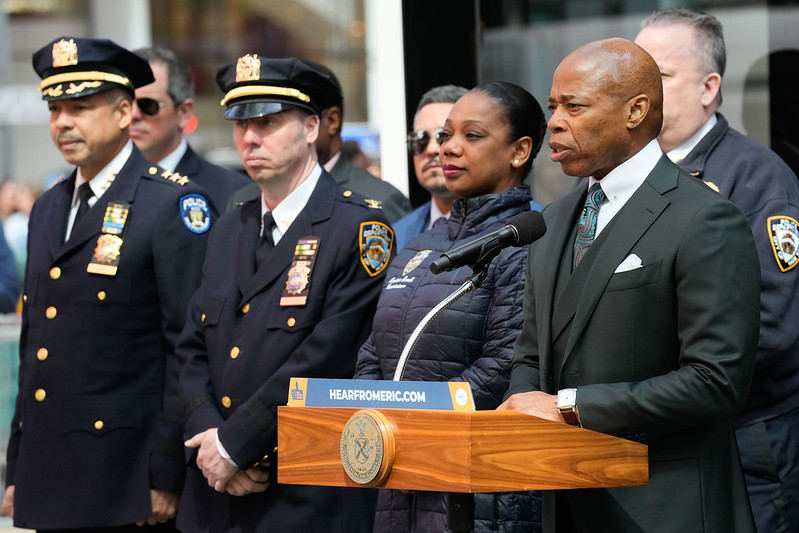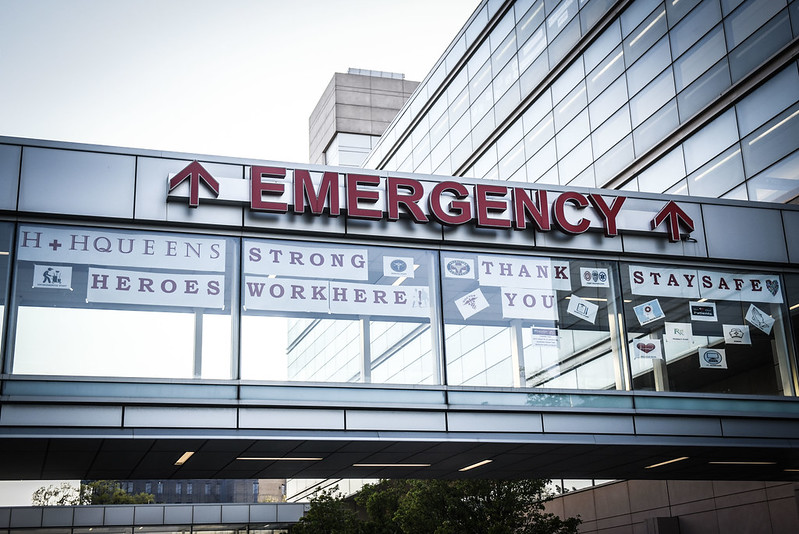Why We Should Abolish the NYPD's Gang Database, Not Reform It

Mayor Adams and NYPD officials (photo: Michael Appleton/Mayor's Office)
This week's report from the Office of the Inspector General of the NYPD (OIG), pointed out numerous irregularities in how the NYPD manages their Criminal Group or “gang” Database (CGD). While these irregularities in procedure confirm our concerns that the database is overly broad, racially discriminatory, and arbitrary, the procedural reforms proposed by the OIG fail to address the larger unexamined issues of whether the existence of such a database is good policy. We think it isn’t and instead support City Council bill 360 that calls for the abolition of the gang database.
In 2018 and 2019 the Grassroots Advocates for Neighborhood Groups & Solutions Coalition (GANGS) testified before the City Council about our concerns that the database uses overly vague criteria for including people in the database, lacks oversight, includes juveniles without notifying their parents, refuses to tell people if they were on the database, and offers no mechanisms for disputing inclusion. The new OIG report confirms all of these concerns.
The fact is that secret databases like this inevitably give rise to shortcuts, arbitrariness, and discrimination. For instance, the OIG found numerous instances in which people were added based on a singular social media report or based on the undocumented allegations or without the required sign off by a supervisor. In addition, entire public housing developments have in essence been labeled a “known gang location” making anyone living there subject to inclusion on the list.
The OIG report also confirmed earlier reports that 99% of those on the list are non-white. In essence, they have defined “gangs” in such a way that they only include people from non white communities, despite the fact that violence, drug dealing, and other collective criminal behavior occurs in a wide variety of neighborhoods. In addition, there are many juveniles in the database including some who are 11 years old. No effort is made to communicate with their parents or provide these young people with much-needed support.
While the OIG report documents a variety of procedural failures it starts off with a claim that it couldn’t find any harms related to inclusion on the database, but later admits that it didn’t really look for them because they would be difficult to find methodologically. But this flies in the face of other reports by similar offices that were able to identify concrete harms. The OIG for the Chicago Police Department found misidentifications, harassment, obstacles to immigration, and racial profiling, all of which they argued furthered the historical divide between the community and the police and contributed to inequities, especially in communities of color.
The GANGS Coalition members have already documented concrete harms including the use of gang designations to deny people bail, enhance sentences, deny someone employment with the city, and contribute to differential treatment by police on the street. While the NYPD OIG found that the database plays a role in how street level policing is conducted, it made no effort to assess whether that treatment might involve unwarranted harassment and abuse, which has been found in other cities and which our members report.
All of this and more has led many to contemplate reforming the database by putting in place more transparency and oversight, but such efforts are both ineffective at getting at the real problem and doomed to failure.
The NYPD has made it clear that it opposes any meaningful reforms and has a history of obstructing them.The OIG report calls for the notification of parents whose children are on the database as long as it doesn’t compromise an existing investigation. But, when the City Council floated this idea, the NYPD said that it would oppose this because of its belief that everyone on the list meets the definition of being part of an active investigation.
We must also ask what the ultimate purpose of reform would be. Small procedural changes to the database generally serve to reinforce the use of police to manage the problems of youth violence.
There are alternatives. The Mayor’s Office of Criminal Justice supports several Cure Violence sites that employ community outreach workers known as “credible messengers” to work in high violence communities to identify and respond to potentially violent situations and work with young people to try to break the cycle of retributive violence as well as help young people develop positive paths forward through educational and vocational supports. In addition, they are ramping up an Advance Peace program based on the successful ones in California that enroll high-risk young people in a variety of services and provide them with income support and financial bonuses for sticking with the program. Research shows that these initiatives work.
But we need to do more.
Newark’s new Office of Violence Prevention and Trauma Recovery is a possible model. Newark Mayor Ras Baraka diverted police funding to create the office, which is using the money to create a holistic community-based response to violence that includes youth programs, outreach teams, intensive trauma counseling, summer jobs, and employment and education support. Violence in Newark is at a 60-year low with significant reductions in homicides and shootings last year. While New York City has some of these programs, they fail to cover many parts of the city and aren’t run cohesively to provide an integrated holistic approach the way that Newark does.
Abolishing the Gang Database will establish the illegitimacy of the tactic of placing large numbers of young men and boys of color in databases based on the suspicions of police. It will be a step towards shifting our emphasis away from “building cases” to repairing harms. The database is a crude and flawed tool that implicates the innocent and fails to adequately address the needs of those young people who are at risk of violence as either victims or perpetrators. Young people involved in violence have all been victims of violence themselves in ways that were never adequately addressed, leaving them scarred, angry, and often alone. If we want to end the violence we need to lift these young people up before the violence, not lock them up and throw away the key after the violence has already happened.
***
Victor Dempsey is community organizer for the Legal Defense Fund. Alex S. Vitale is Professor of Sociology at Brooklyn College and the CUNY Graduate Center. Both are members of the GANGS Coalition. On Twitter @avitale.
***
Have an op-ed idea or submission for Gotham Gazette? Email This email address is being protected from spambots. You need JavaScript enabled to view it.
What Behavioral Scientists Tell Us About Pay-to-Play in Government

Gov. Hochul delivers a check (photo: Darren McGee/Governor's Office)
Here’s a story you’ve probably heard: A CEO donates $50,000 to a state governor’s political campaign. Not long after, the CEO’s company gets a $50,000,000 contract from the state. A reporter asks the politician if it was pay-to-play, and the governor’s office says: “No donation of any size has any influence on the governor’s decisions – period.”
The politician may truly believe this, but a substantial body of research suggests the opposite: When people receive a gift, they want to return the favor. Reinvent Albany’s new report, “Buying Influence Works,” details at least 13 studies showing that corporate gifts for politicians are usually followed by political gifts for corporations. For a state like New York where business executives are free to donate up to $18,000 to the Governor while bidding on state contracts, the implications of this research are dire.
While there is plenty of evidence that gifts influence politicians, there is even more showing that drug companies influence doctors. Researchers have spent three decades thoroughly documenting the pharmaceutical industry’s efforts to influence physicians. Thanks to their research, it is now well known that gifts and payments from drug companies cause doctors to prescribe more of those companies’ drugs and use more of their equipment. Studies funded by drug companies also tend to produce findings those companies like.
Drug manufacturers market their products to doctors through a process known as “detailing.” Drug company representatives go to the doctor’s office and bring some sandwiches for the doctor and her entire staff. As the doctor eats her sandwich, the representative explains the medication (or artificial knee, hearing aid, etc.) to the doctor and addresses any concerns. Now the doctor is more familiar with the product, and she has a full stomach to boot. (Though the practice is not as common as before, ‘detailers’ also sometimes give away branded swag – pens, totes, baseball hats, coffee cups – to keep their product fresh in the doctor’s mind.)
Does detailing work? Without a doubt. One study found that even a single meal from a drug company made doctors more likely to prescribe that company’s drug, and another that doctors receiving meals from drug companies prescribed that company’s drugs at rates up to 5.4 times higher than before. Reviewing the literature, Reinvent Albany could not find a single study showing no correlation between free meals for doctors and an increase in prescriptions (though still prevalent, detailing is less pervasive than it used to be).
In the research field, one of the worst actors has been Big Tobacco, which produced mountains of pro-smoking studies after concerns about cigarettes’ health impact emerged in the 1950s. Unsurprisingly, 94% of reviews by researchers affiliated with Big Tobacco produced positive findings for the industry, compared with 13% of independent reviews. When controlling for factors such as article quality or peer review, the odds that an industry-affiliated author’s study would favor Big Tobacco were 88 times higher than for non-affiliated authors. Soft drink producers and gas companies must have been taking notes.
Like politicians, many doctors and researchers deny that they’re influenced by gifts. One survey had only 8% of doctors saying small branded gifts could affect their habits. When a pharmaceutical company paid for physicians’ trip to a symposium at a luxury resort, nine of out of ten doctors said the trip would have no effect on their prescription habits (the study, of course, found otherwise). And like politicians, physicians will acknowledge the problem of pay-to-play while claiming they themselves are immune: One survey had only 39% of medical residents acknowledging that gifts could influence their prescriptions, while 84% believed other physicians are susceptible.
What does this research say about New York State? We know that the 2022 gubernatorial election was one of the most expensive in state history, and many of the largest donors had business before the state. Elected officials claim that large contributions have no bearing on state decisions, but even if that’s true, the appearance of corruption – not to mention the state’s countless pay-to-play scandals – continues to undermine the public’s faith that the government is working for the people, not wealthy donors.
New York City understands the obvious risk of pay-to-play and limits campaign contributions from people doing business with the city to $400 for mayoral candidates and $250 for City Council candidates. Embarrassingly, New York State has not passed a single law to control this kind of behavior. As of 2023, CEOs seeking contracts from the state are free to donate up to $18,000 to Governor Kathy Hochul, $10,000 to State Senators, and $6,000 to Assembly Members.
State leaders need to do much better. They can start by passing Senator Zellnor Myrie’s common-sense bill, S6247, which prohibits business executives from contributing to the Governor while seeking contracts from the state. It’s a strong first step to win back the public’s trust.
***
Tom Speaker is a policy analyst at Reinvent Albany. On Twitter @RealTomSpeaker & @ReinventAlbany.
***
Have an op-ed idea or submission for Gotham Gazette? Email This email address is being protected from spambots. You need JavaScript enabled to view it.
Everyone Deserves the Chance for a Life-Saving Organ Transplant If They Need It

Emergency (photo: Michael Appleton/Mayoral Photography Office)
Imagine that one day you wake up with a slight cough. Thinking it is a cold or allergies, you take over-the-counter cough medicine, cough drops, and even at-home remedies. Five months later, nothing seems to be working and, at your wife’s urging, you finally go to the doctor. He runs several tests and a few weeks later you get a call to come back to the office. The doctor has devastating news: “Miguel, you have Stage 4 lung cancer and you need a lung transplant.”
But there’s hope - a transplant could save your life. You are only 36 and otherwise healthy; you have a son who just turned 7, a loving and happy marriage, and so much to live for.
But you are also undocumented, so unless you can come up with nearly a million dollars, you do not qualify to be on an organ donation list and you will not get this life-saving transplant.
We’d like to think of New York as an inclusive beacon of hope and humanity, but we are failing one of our most vulnerable populations — our undocumented immigrants. We do not have a healthcare policy that covers every New Yorker.
The emergency Medicaid program covers urgent situations for undocumented immigrants, like a tracheotomy procedure or an emergency C-section, but does not cover organ transplants. Notably, however, undocumented people can donate organs. This means that although they can donate an organ to save someone else’s life, if their own life depends on a heart, lung, or kidney transplant, they are left to die.
Undocumented people should not be handed a death sentence when an organ fails simply because they lack a piece of paper and a social security number.
Miguel’s story, while heartbreaking, happens more often than it should. According to LiveOn NY, about 6,000-9,000 undocumented people in the U.S. have kidney failure requiring a life-saving transplant. Yet, only 1% of all kidney transplant recipients are
undocumented. This jarring statistic reflects only the plight of undocumented Americans in need of a kidney transplant. Thousands more need a lung, heart, liver, or other critical organ in order to survive, but are shut out because of their immigration status.
We believe that a policy dictating who lives and who dies based on immigration status is inhumane and unethical. This is why we are introducing the Humanitarian Emergency Access for Required Transplants Act, or HEART Act, which will require the State to expand healthcare coverage to include medically necessary organ transplants, regardless of immigration status. This would ensure that someone like Miguel can be placed on the transplant list and be covered for surgery, post-medical care, and prescription drugs.
Our legislation is not without precedent. In 2014, Illinois passed a similar bill into law that expanded public health coverage for emergency kidney transplants for undocumented immigrants. Although this is a step in the right direction, we must go further in New York and cover the care needed for the transplant of any organ where a person’s life is at risk, regardless of immigration status. Our undocumented neighbors must be recognized and treated like New Yorkers, and their survival should not depend on their immigration status.
***
Assemblymember Catalina Cruz represents parts of Queens. State Senator Nathalia Fernandez represents parts of the Bronx. On Twitter @CatalinaCruzNY & @Fernandez4NY.
***
Have an op-ed idea or submission for Gotham Gazette? Email This email address is being protected from spambots. You need JavaScript enabled to view it.




